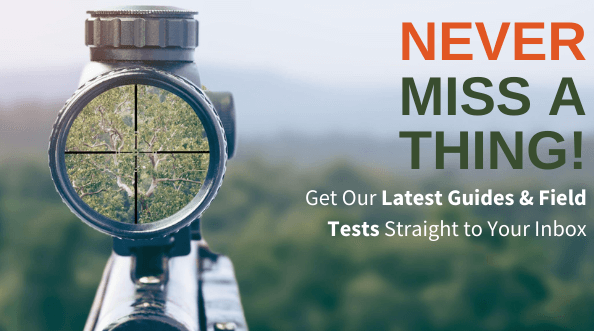The gas block A2 front sight, stock nylon handguard, M4 buttstock, Ruger-designed trigger and rear flip-up sight are iconic features of the AR-556.
I have the Ruger AR-556 with the free-float handguard that I’ve customized a little bit over time.
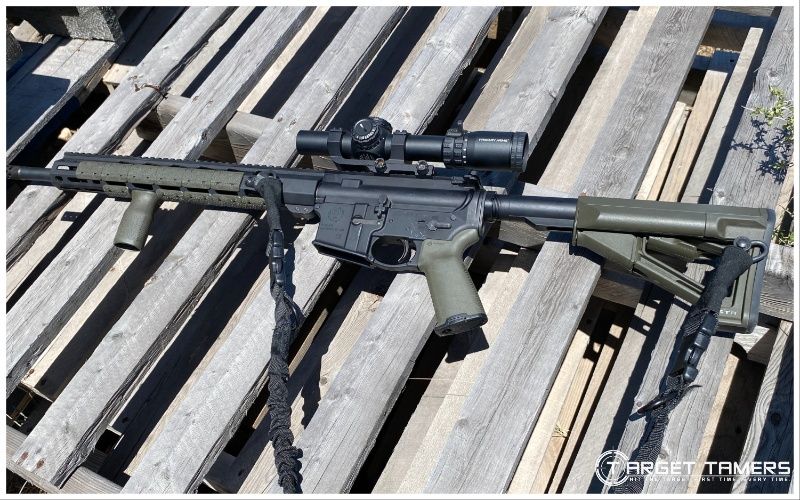
With the right mounting system, you can put almost anything on this Ruger.
In my search for the best scope for my Ruger AR-556, I compare LPVO scopes, red dot sights, and I even include a magnified scope to provide an array of options. I’ll also go over specific scope features like cost, specs, reticles, and size to further break things down.
Why Trust Us?
After hundreds of hours of hand-testing scopes in the field and at the range, and thousands more hours researching and writing about them, we feel we earn the title of experts when it comes to optics!
We purchase as many of the optics for our tests as possible, and run them through their paces to make sure they will perform at the range and in the field.
Our combined decades of experience from rapid target transitions, to big game hunting and competitions has been integral in putting together this round-up of the best scopes & red dots for Ruger AR-556.
Get the inside scoop on how we test optics here.
Best Scopes & Red Dots for Ruger AR 556
1. Trijicon ACOG TA31 4x32 – Best Overall
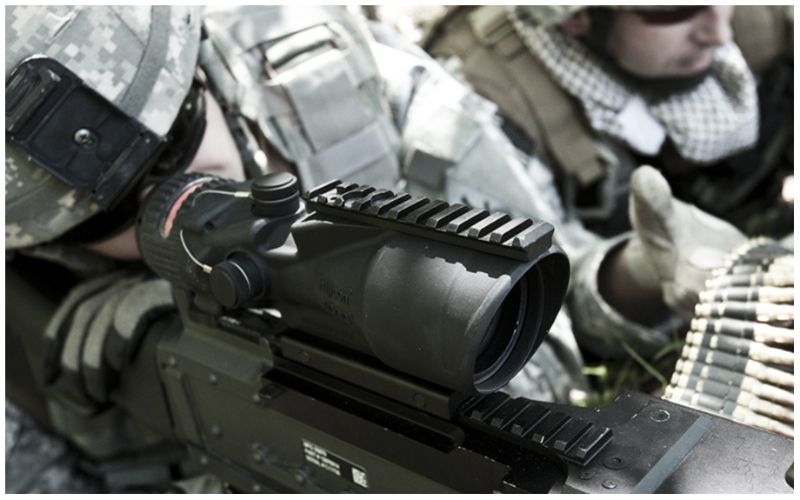
ACOG stands for Advanced Combat Optical Gunsight. As it is, it’s perfectly suited to the Ruger AR 556. In fact, it’s an excellent AR-15 scope in general whether it’s a Bushmaster, Diamondback, FN-15, Colt, or any other type of MSR from another manufacturer.
Pros:
- Combat proven
- Fixed magnification
- Battery-free illumination
- BDC reticle
- Two-eyes open
Cons:
- Price
Acquiring the best costs money, and the ACOG isn’t a cheap sight. Even though it has fixed and not variable magnification, it has battery-free illumination and is built to withstand the toughest abuse. It costs good money for those features.
I like that there are tons of different .223/5.56 reticles to choose from if you want something different than the Red Chevron reticle. They’re all glass-etched and the illumination is powered by fiber optics and tritium.
Even though its magnified, Trijicon has the Bindon Aiming Concept (BAC) that allows for two-eyes open. This ACOG also comes with the TA51 mount and a scopecoat. I suppose that’s money well spent since mounts can cost more than $100 to get the height needed for a flat-top rail.
For the money, the Trijicon ACOG is one of the expensive options out there, but there’s a lot that it offers that you just won’t get anywhere else.
2. Holosun HS510C – Best Shake Awake Red Dot
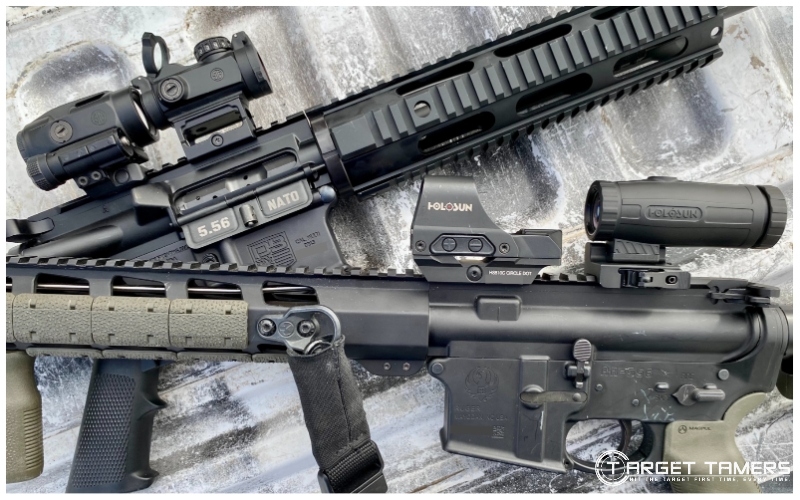
The HS510C is one of my favorite Holosun red dot sights to date. It has so many features that I find convenient and practical for most of my needs including some hunting. But it mainly gets used as a target shooting sight and will be used when the SHTF.
Pros:
- Dot & circle reticle
- Long battery life
- Multiple reticles
- Solar FailSafe
- Shake Awake
Cons:
- Astigmatism
If you have astigmatism or are near or far sighted, you might have trouble with the dot. I consistently see double dots with the HS510C, but I’ve learned that it’s not so bad. I’ll take that over a cluster of dots any day! The sight itself is not defective, it’s my vision. I purchased the HM3X magnifier just for this sight, and it clears the anomaly right up.
I like the 2 MOA dot with a 65 MOA circle reticle. It’s fast, easy to use, and it’s my preferred choice of its multiple reticles. I suppose using just the 65 MOA circle reticle would clear up any dot issues you and I may have since there’s no dot…? It’s an option anyway.
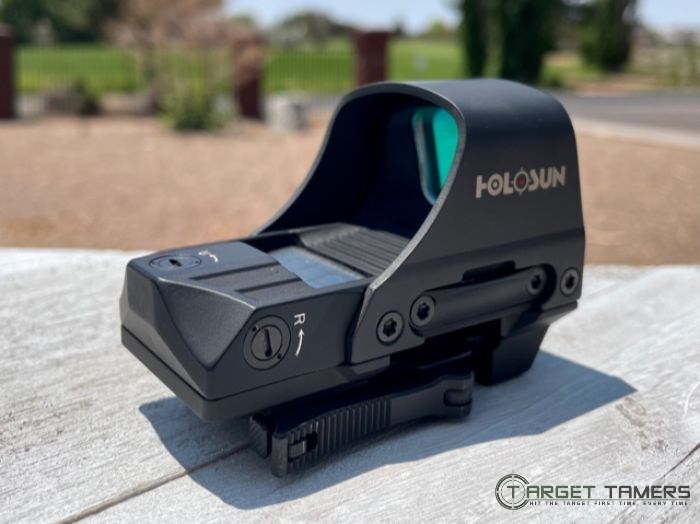
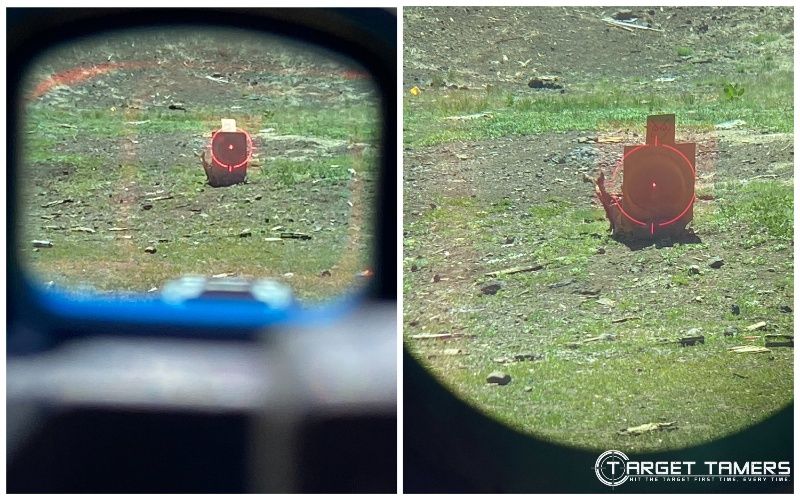
Holosun has industry-best battery runtimes of 50,000 hours. In case of battery failure, this red dot has the Solar Failsafe panel that will power the illumination.
With Shake Awake, this red dot has a motion sensor. It deactivates the illumination after a set amount of time and reactivates when it detects motion.
Though it’s bigger than enclosed micro red dot sights, it has a shorter mounting length than a scope or even the EXPS3 holographic sight (which I compared here). Removing the rear flip-up sight will give just enough mounting length for the HS510C and the HM3X on the rail of a Ruger AR-556.
3. Vortex Strikefire II – Best Red Dot Sight
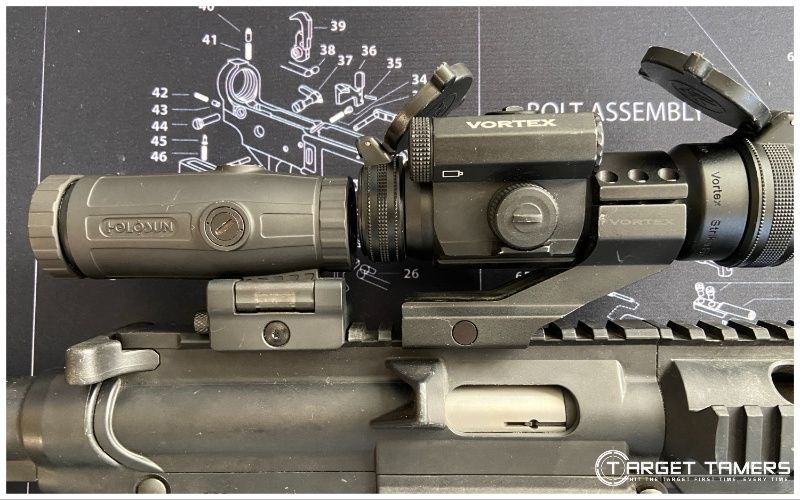
On average, there are many who have a Vortex scope on their Ruger AR 556, but the Strikefire II remains one of the most popular red dot sights from this manufacturer. It’s affordable, can come in either red only or dual illumination, and it comes with an included cantilever mount.
Pros:
- Price
- Red dot sight
- Red or dual illumination
- 4 MOA dot
- Included mount
Cons:
- Not the best for astigmatism
How you see the dot will be different to the next person, but I personally see this dot as a group of clusters and that’s just being far sighted. However, the Strikefire II is still a personal favorite of mine and sees much of its time on a M&P 15/22 and a Ruger AR-556.
The dual illumination is nice, but I usually stick to the red. As a side note, there are benefits to green illumination and I compare red VS green here. The 4 MOA dot is large and excellent for close range use, and since I’m usually inside 200 yards with the Ruger, it’s perfect for the job.

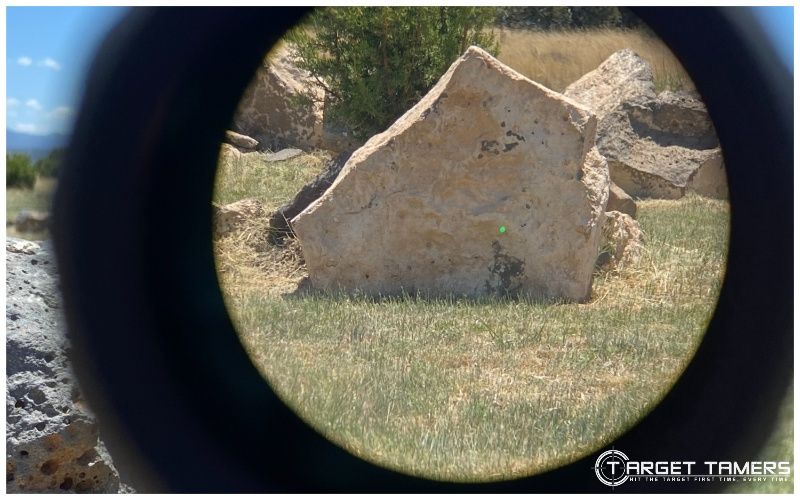
It comes with flip-up caps and a single-ring cantilever mount. I haven’t had to upgrade either for as long as I’ve had the Strikefire. Suffice it to say, I’m happy with the accessories.
I’m not a huge fan of the CR2 battery, but since my laser rangefinders take the same, I usually have a spare on hand if the Strikefire needs it. Other than that, this Vortex red dot sight is exactly what it appears to be – a red (or green) dot made for CQB with button control, an easy to see aiming point, and ideal for mounting to the AR-15.
4. Primary Arms GLx 1-6x24 FFP – Best LPVO
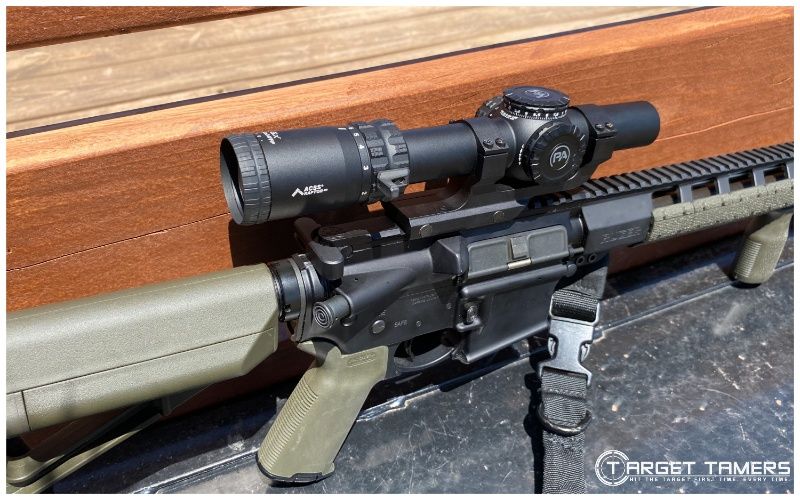
I personally love the Primary Arms GLx 1-6x LPVO. It’s a MIL scope, comes with an exposed, tactical turret (if that’s your thing), and the glass is excellent with a super sharp chevron reticle instead of a dot. LPVs couldn’t be more ideal than when on a Ruger AR 556.
Pros:
- Price
- ED glass
- FFP reticle
- ACSS Raptor M6 reticle
- Long eye relief
Cons:
- Not daylight bright
If you’re looking for super bright illumination, you’ll be disappointed. However, the black, glass-etched reticle is highly visible in most conditions, and when you’re in low light, that’s when illumination is needed. With intermittent off positions, 10 settings, and AutoLive (auto shut-off), the Primary Arms LPVO will not fail to acquire a fast sight picture - illuminated or not.
It does take a separate purchase to get a cantilever mount to get it on the Ruger AR 556, but a 30mm one will do it. Even though the specs say it has around 3.5” of eye relief, I found that it has more than that. It’s closer to 4” at max 6x power, so I’d say that’s long for an LPVO scope!
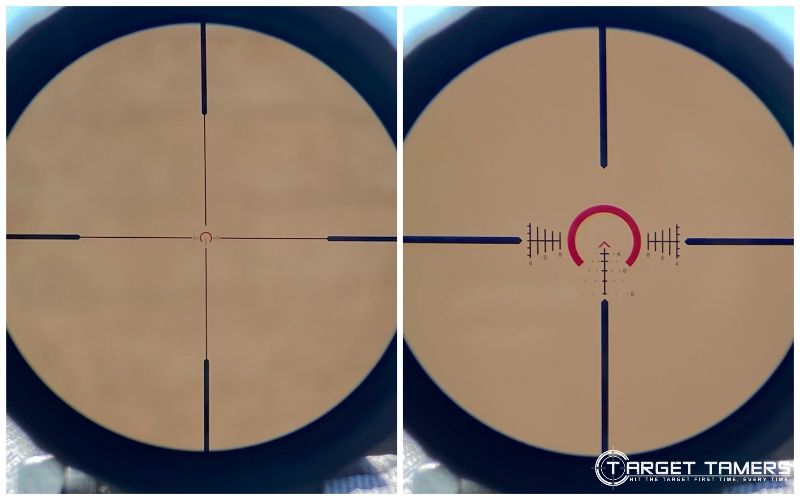
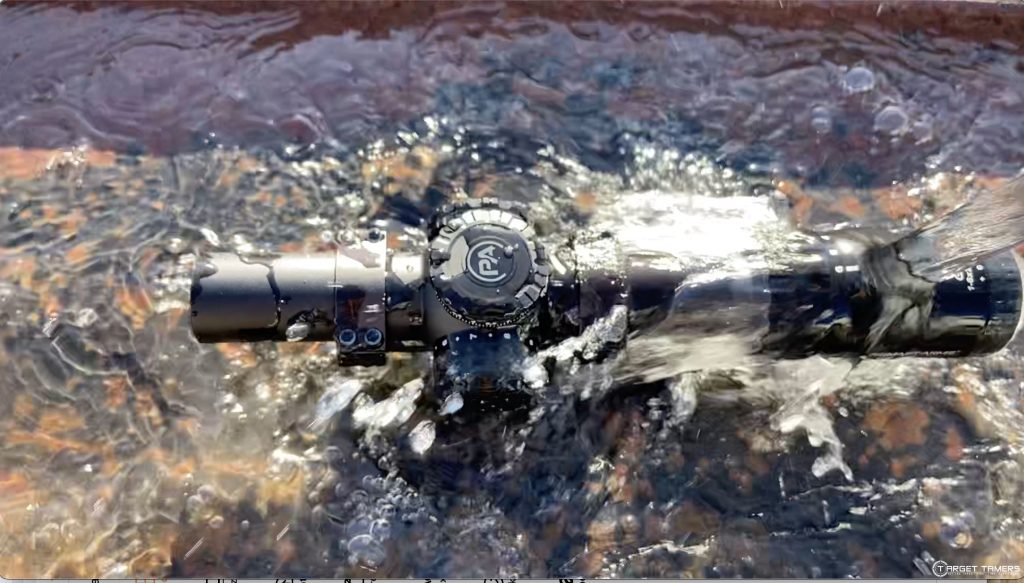
The ACSS Raptor M6 reticle is one of my favorite features. The chevron is truly precision sharp and only the chevron and horseshoe are illuminated. It has drop calibrated for the .223/5.56 but you can always find your holdovers with a ballistic calculator.
Having mounted this to my Ruger AR 5.56, I can give it both thumbs up that it’s a nice LPVO worth having on there.
5. Maven CRS.2 4-16x44 – Best for Hunting
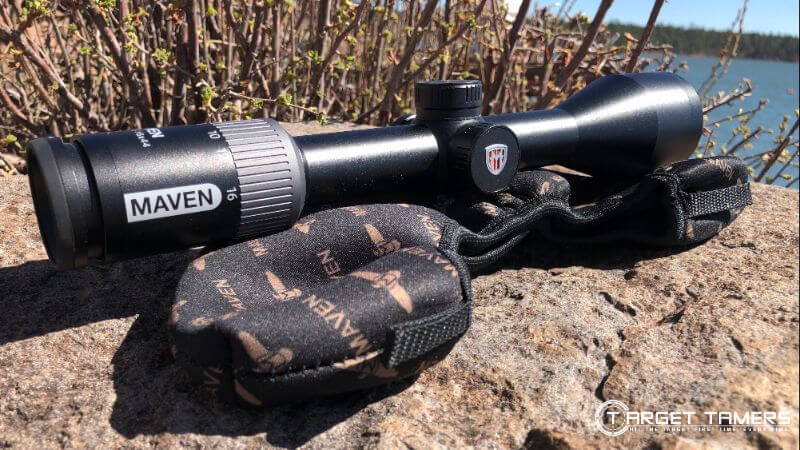
The Maven CRS series of scopes are one of my favorite hunting scopes from Maven. They’re affordable (for a Maven), have superb glass clarity, and the CRS.2 has a side focus and an all-purpose hunting configuration of 4-16x44.
Pros:
- CSHR reticle
- ED glass
- 0.25 MOA adjustments
- SFP reticle
- Side focus
Cons:
- Tight eyebox at 16x
With an SFP reticle, holdovers are accurate only at max power. On the CRS.2, this means the CSHR reticle holdovers are good at 16x magnification. Eye relief does shrink to 2.4”, which is fine on the Ruger AR-556, but you must be consistent about getting your eye inside the eyebox.
The CRS.2 scope should mount to the Ruger, but you’ll probably want to use a 1” cantilever mount to get it high enough, clear the handguard, and make sure it gets back far enough to get proper eye relief. You will need to remove the rear sight too.
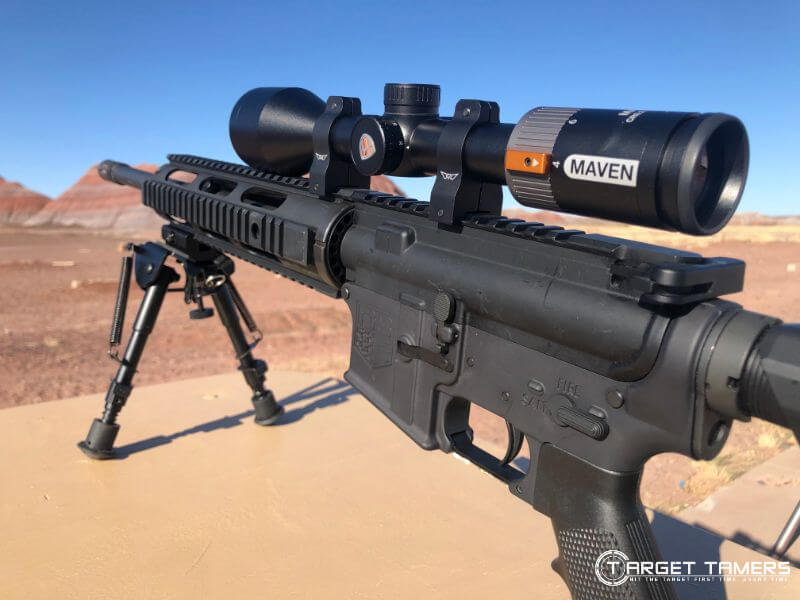
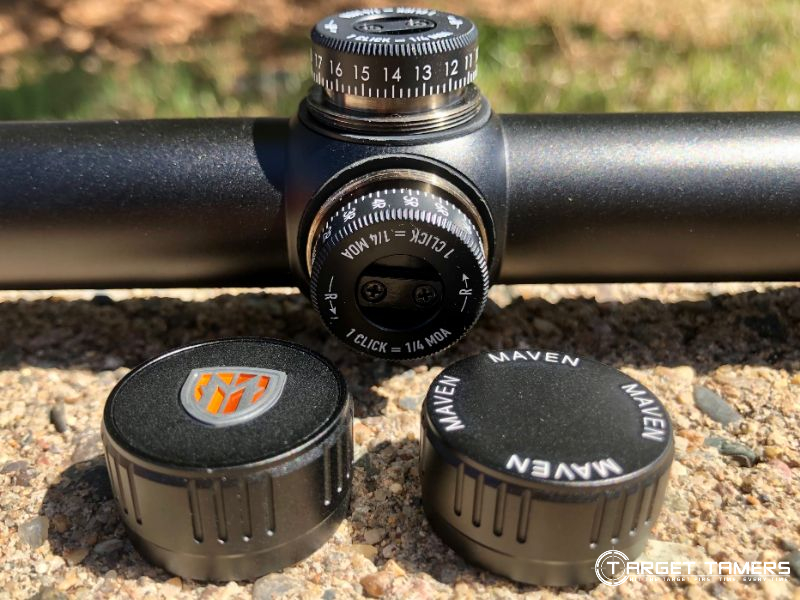
The tradeoffs are worth it if you’re hunting with your AR-556 because you’ll have precision shots with 0.25 MOA adjustments, a side focus that comes down to 25 yards, and exceptional clarity from the ED glass elements.
There’s no reason you can’t put a magnified scope on an AR-15. You just need to find the right mounting system. If you can do that, the Maven CRS.2 will be a workhorse in the hunt for coyotes, hogs, and maybe deer.
6. Vortex Strike Eagle 1-8x24 FFP – Best for Shooting to 600 Yards
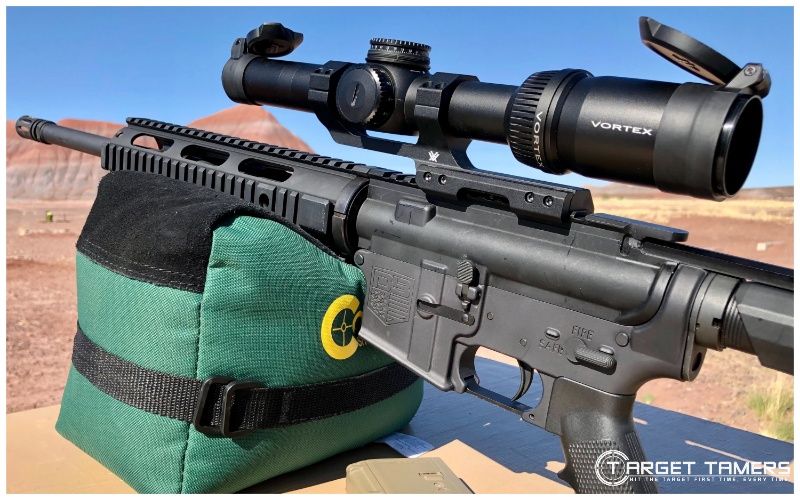
The Strike Eagle is a great scope and is the one you ought to get if you want to stick with Vortex, get a reticle in the FFP, and have an LPVO on your Ruger AR 556. What’s different about the Strike Eagle from other LPVs is that it comes with flip-up caps and a sunshade!
Pros:
- FFP reticle
- 0.75 MOA floating dot
- EBR-8 MOA reticle
- True tracking
- Fog/waterproof
Cons:
- Small at 1x
As an FFP scope, the reticle does get small at 1x power. This is to be expected, and illumination is pretty much required at 1x to acquire red dot like performance. Though it’s great at 8x power, the Primary Arms GLx 1-6x LPVO is larger at 1x than the Strike Eagle but is not as bright.
The EBR-8 reticle offers usable drop and wind holdovers, and it does feature a separate auto-ranging reticle that hovers above. I used this with an AR-15 and a bolt-action rifle. The reticle has holdovers for the .223/5.56 out to 600 yards – so great for CQB and stretching the distance if needed. It tracks true, holds zero, and the 0.25 MOA turrets are resettable to zero.
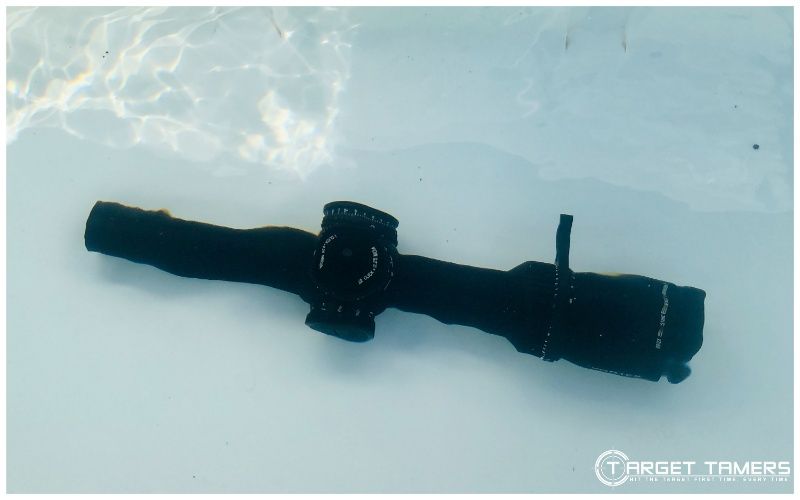
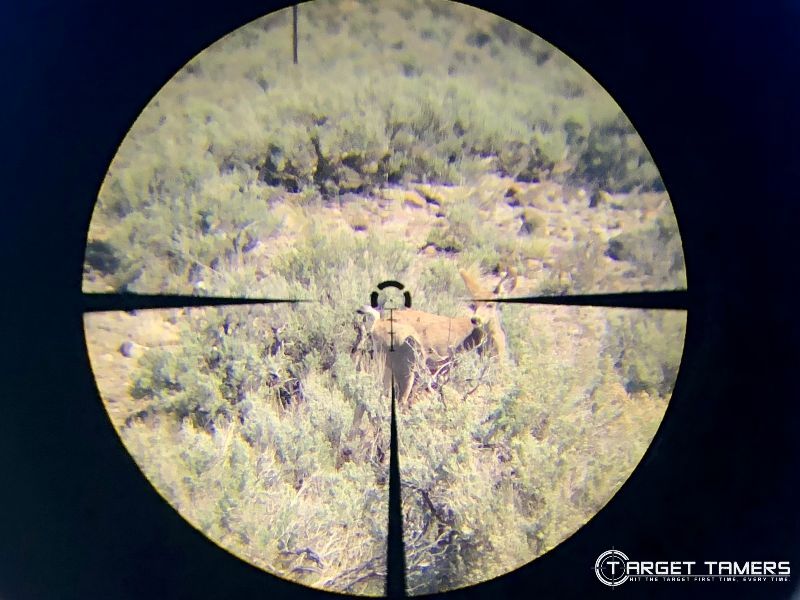
What I’m amazed with is that the scope is fully waterproof. I submerged the Strike Eagle into a chilly bin filled with water for 30 mins, and it survived. I continue to use this scope to this day. I don’t advise that you replicate my water-testing methods though.
The sunshade is awesome, and since it came with one, I like to make sure it’s used. Though the flip-up caps could be better in quality, it’s what came with it, so I have no plans to upgrade them.
For the most part, the Strike Eagle is a fantastic, all-round scope for multiple applications especially if you want quality while on a budget. Just don’t forget that it’s all in the diopter to get a sharp sight picture and eliminate fish-eye at 1x magnification.
7. Bushnell AR Optics 1-4x24 – Best Budget
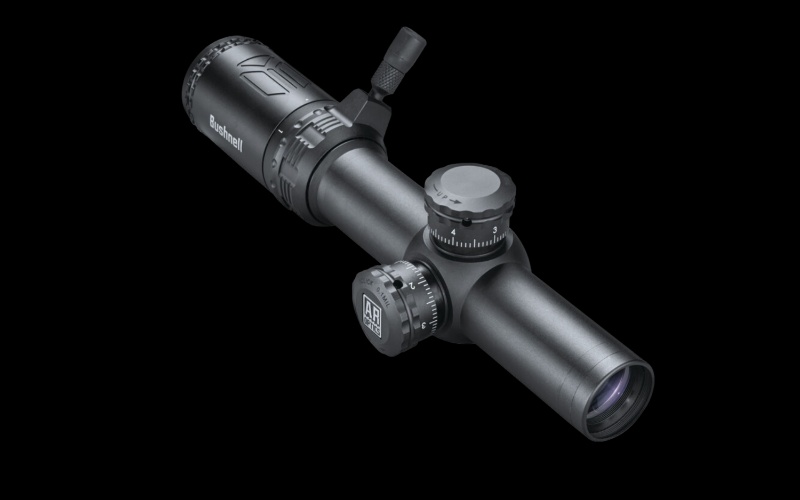
In general, simplicity is what’s desired. The Bushnell AR Optics 1-4x LPVO provides that with the Drop Zone-223 reticle, no illumination, exposed turrets, and a throw lever to make fast power transitions.
Pros:
- Price
- LPVO
- Drop Zone-223 reticle
- SFP reticle
- Decent optics
Cons:
- No illumination
There is an illuminated version of this scope, but you’re looking at double the price for one. The illuminated scope puts the reticle in the FFP, and it changes to a dot with drop crosshairs and a horseshoe. This may not be everyone’s piece of cake, so if staying under $150 is where you want to be, this SFP scope is for you.
The Drop Zone-223 reticle is calibrated for the .223/5.56 cartridge, so it’s ready for bullet drop out to 600 yards. Since it’s in the SFP, you can be grateful for the included Throw Down PCL power change lever that will get you up to 4x fast for accurate holdovers.
As far as the optics go, you’ll have decent performance. The lenses have FMC coatings which is excellent for its price point. The AR scope is parallax set for 100 yards, and as a 1-4x scope on top a Ruger 556, it’s certainly made for CQB with some distance if the circumstances dictate.
You might also like that this scope has adjustments in MILs. So, if you’re looking for something other than an MOA scope at a budget price point, the Bushnell AR Optics 1-4x LPVO fits the bill.
Discover the optimal shooting experience by comparing a 1-4x LPVO scope to a red dot sight's quick targeting capabilities.
8. Sig Sauer Romeo 5 – Best Micro Red Dot Sight
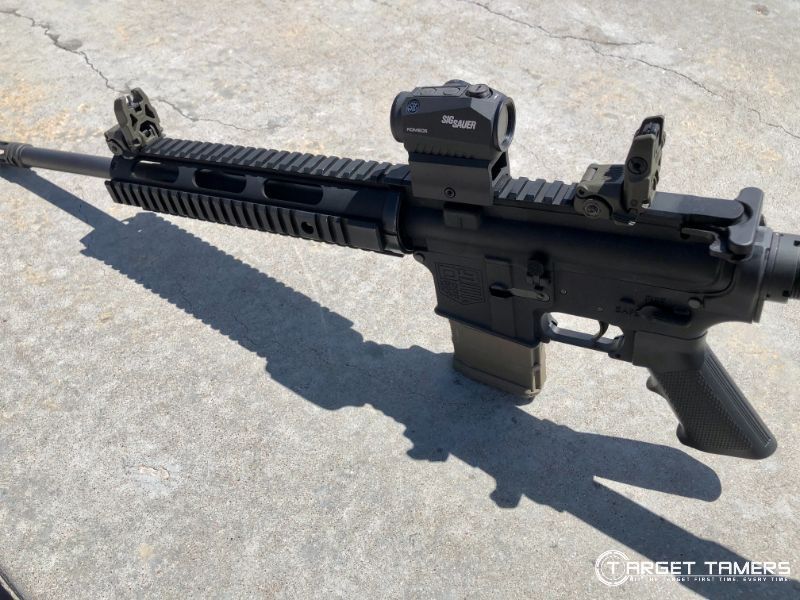
Unlike the Vortex Strikefire II, the Sig Sauer Romeo 5 is an enclosed micro red dot sight. There’s a difference. It’s small, compact, lightweight, and features a 2 MOA dot with other features that might be appealing to the shooter on a budget.
Pros:
- Price
- MOTAC
- 2 MOA dot
- Multi-height mount included
- Compact
Cons:
- Gets stuck on rail
Don’t over torque the Romeo 5 or keep it in the hot sun for a long period of time. It might just end up stuck on your rail like it did on mine. Other than that, the Romeo 5 has been a faultless red dot sight for my AR-15 rifles.
It’s perfect for those wanting to keep BUIS sights on the rail for a co-witness. It has a short mounting length compared to LPVO scopes, and it can also be paired with a magnifier if you want some magnification.
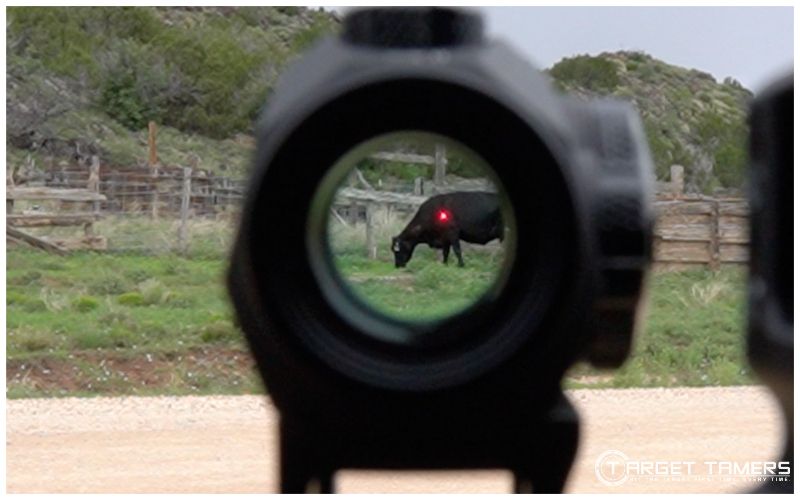
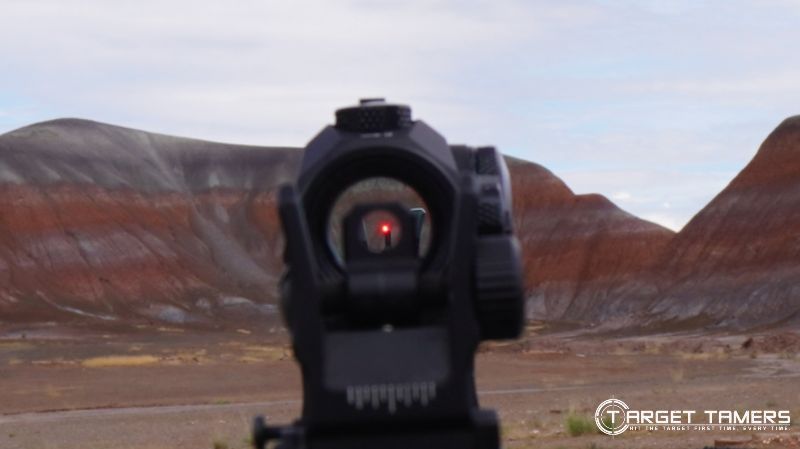
The 2 MOA dot has got me out to 200 yards with expected accuracy on an AR-15, and with 0.5 MOA adjustments, it’s not hard to zero it at all. Even though it’s a red dot sight, it would be great for a bunch of applications from target shooting to hunting and even on a home defense or duty rifle.
With MOTAC, it automatically powers down after two minutes but is ready to go when motion is detected. It has an impressive battery life of 40,000+ hours which is way better than what an illuminated scope or LPVO can compete with.
There are benefits to opting for a red dot sight over an LPVO, and it’s certainly one of the cheaper red dots to put on a Ruger AR 556.
A Guide to Choosing the Best Scopes for Ruger AR 556
Cost
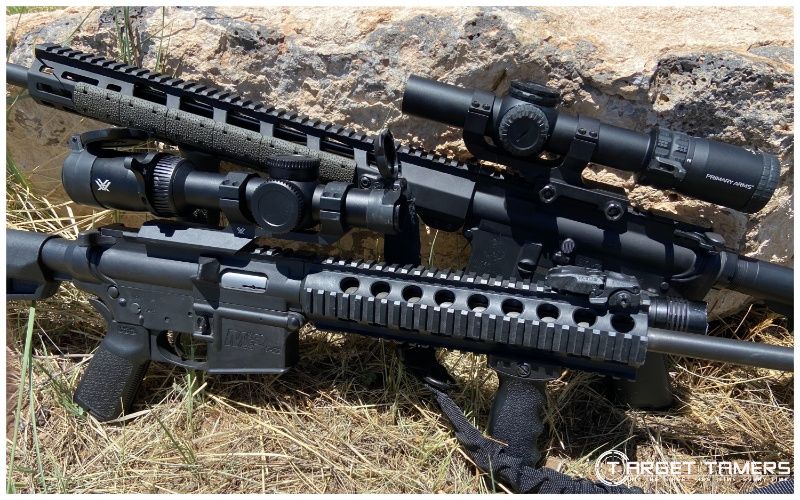
In general, the budget is set by the intended application. If professional-grade glass and performance is required, scopes can cost over $1000 and red dots can cost between $500-$1000. For close range, home defense, or range use, a budget between $100-$600 will get you something dependable.
| Product | Feature | Price Range |
|---|---|---|
| Trijicon ACOG TA31 | Best Overall | Under $1200 |
| Holosun HS510C | Best Shake Awake Red Dot | Under $350 |
| Vortex Strikefire II | Best Red Dot Sight | Under $200 |
| Primary Arms GLx FFP | Best LPVO | Under $600 |
| Maven CRS.2 | Best for Hunting | Under $600 |
| Vortex Strike Eagle FFP | Best for 600 Yards | Under $600 |
| Bushnell AR Optics | Best Budget | Under $150 |
| Sig Sauer Romeo 5 | Best Micro Red Dot Sight | Under $150 |
Configuration & Glass

Many scopes and red dots that are primarily used on the Ruger AR-556 are LPVOs or 1x red dot sights. This means close-quarter magnification of 1-4x, 1-6x, 1-8x, and more variations or non-magnified (1x) red dots. However, some prism scopes offer fixed magnification, like the ACOG.
Having magnification means you can stretch the distance or ‘zoom’ in for a magnified sight picture.
| Product | Magnification | Objective Lens | Glass Type |
|---|---|---|---|
| Trijicon ACOG TA31 | 4x | 32 mm | Non-ED Japanese glass |
| Holosun HS510C | 1x | 0.91 x 1.26” | Non-ED glass |
| Vortex Strikefire II | 1x | 30 mm | Non-ED glass |
| Primary Arms GLx FFP | 1-6x | 24 mm | ED glass |
| Maven CRS.2 | 4-16x | 44 mm | ED Japanese glass |
| Vortex Strike Eagle FFP | 1-8x | 24 mm | Non-ED glass |
| Bushnell AR Optics | 1-4x | 24 mm | Non-ED glass |
| Sig Sauer Romeo 5 | 1x | 20 mm | Non-ED glass |
Specs
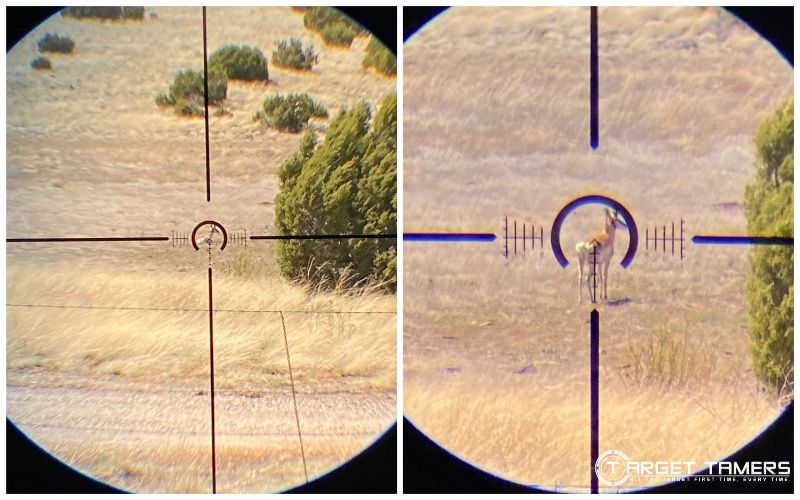

The specs mustn’t be overlooked as they play an essential role in how comfortable the scope is to use, how much of a sight picture you can see through the scope, and how precise you can get your groups.
The field of view is the measured space of the terrain you can see through the scope. The wider it is, the easier it is to follow moving targets or maintain situational awareness.
The eye relief is set when you’re mounting and leveling a scope. I’d say a minimum of 2” is needed on a Ruger AR-556 as recoil isn’t bad at all. However, the longer it is, the more comfortable it can be to maintain a natural cheekweld and still be inside the eyebox at any magnification.
The adjustment system is scope specific. There will be MOA and MIL scopes, and this will be a deciding factor when you choose which scope is best for you.
Many LPVO scopes have 0.5 MOA adjustments, and red dots will vary between 1 MOA and 0.5 MOA. Scopes offer more precision with 0.25 MOA or 0.1 MIL adjustments. This is a general rule of thumb, but you can usually find one that doesn’t follow the rules, like the Primary Arms LPVO with 0.1 MIL adjustments!
| Product | Field of View (@ 100 yards) | Eye Relief | Adjustments |
|---|---|---|---|
| Trijicon ACOG TA31 | 36.8 ft | 1.5” | 0.5 MOA |
| Holosun HS510C | Unlimited | Unlimited | 0.5 MOA |
| Vortex Strikefire II | Unlimited | Unlimited | 0.5 MOA |
| Primary Arms GLx FFP | 104.7-18.3 ft | 3.5-3.3” | 0.1 MIL |
| Maven CRS.2 | 25.6-6.4 ft | 3.4-2.4” | 0.25 MOA |
| Vortex Strike Eagle FFP | 113.6-14.1 ft | 3.9” | 0.25 MOA |
| Bushnell AR Optics | 112-27 ft | 3.5” | 0.1 MIL |
| Sig Sauer Romeo 5 | Unlimited | Unlimited | 0.5 MOA |
Reticles
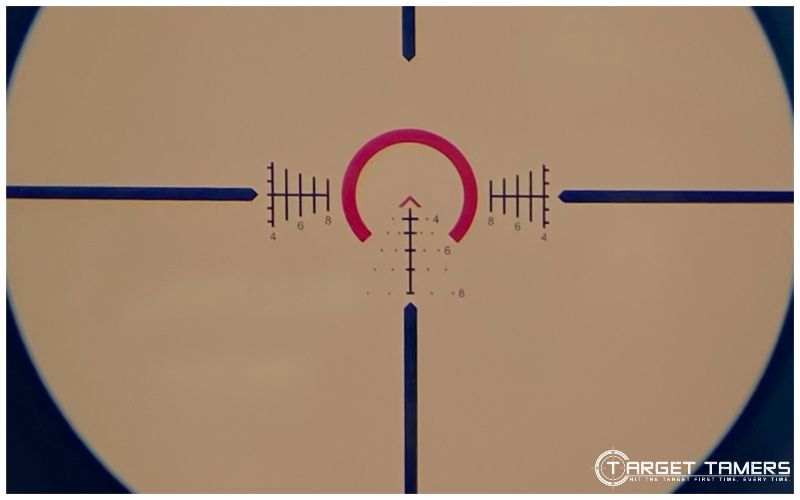
The choice of reticle should be determined by your application. You don’t need complex drop and wind reticles if you’re someone who dials in all your shots. You may want a simple dot or crosshairs if all your shots are inside 100 or so yards.
The type of reticle will vary between all firearm optics. It’s a matter of personal preference at this point.
| Product | Reticle | Focal Plane | Illumination |
|---|---|---|---|
| Trijicon ACOG TA31 | Red Chevron | SFP | Adjustable |
| Holosun HS510C | 2 MOA dot/65 MOA circle | SFP | 10 settings |
| Vortex Strikefire II | 4 MOA dot | SFP | 10 settings |
| Primary Arms GLx FFP | ACSS Raptor M6 | FFP | 10 settings |
| Maven CRS.2 | CSHR wire | SFP | No |
| Vortex Strike Eagle FFP | EBR-8 MOA | FFP | 9 settings |
| Bushnell AR Optics | Drop Zone-223 | SFP | No |
| Sig Sauer Romeo 5 | 2 MOA dot | SFP | 10 settings |
Size/Weight
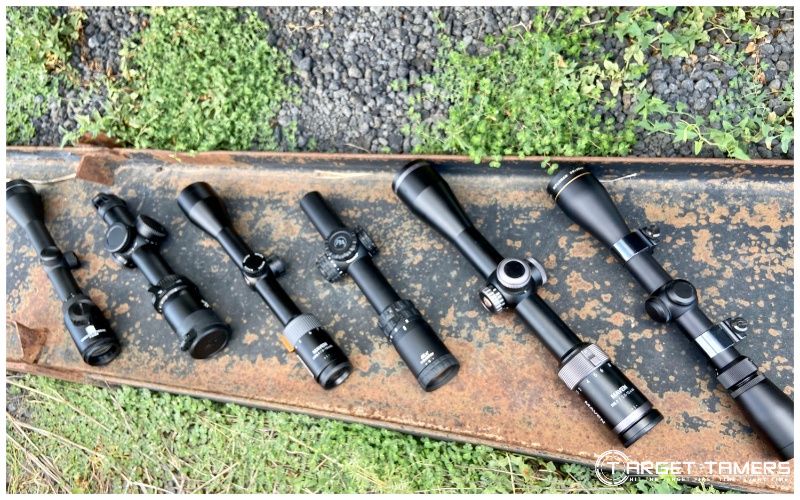
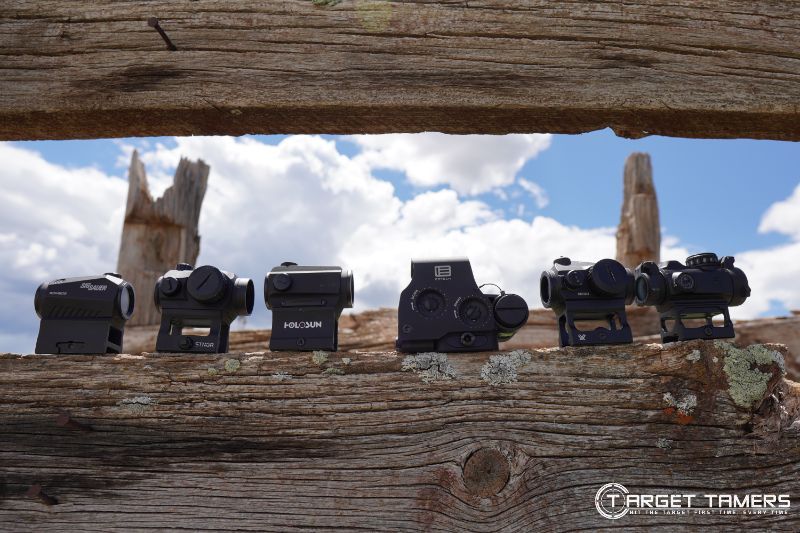
The overall size and weight will be factors to consider since there’s limited mounting space on the upper receiver of a Ruger AR-556. I suppose it’s not any shorter than a flat-top with a free-floating handguard, but it’s the mount that will make the difference.
However, red dot sights provide the smallest footprint on the rail. You could also have enough room to add a magnifier to the mix and probably keep the rear flip-up sight on the rail too.
LPVO scopes and magnified scopes will require a higher mounting system. An offset cantilever mount will make sure that the scope gets mounted with rings in the right place on the tube and the mount on the rail and not protruding on the handguard.
As far as weight goes, red dots are the most obvious compact and lightweight option. LPVOs range anywhere between 16-24 oz but are shorter in length. Scopes can weigh upwards of 11 oz with lengths as long as 14”.
| Product | Dimensions | Weight | Waterproof |
|---|---|---|---|
| Trijicon ACOG TA31 | 5.9 x 2 x 2.5” | 14.9 oz | Yes |
| Holosun HS510C | 3.3 x 1.8 x 2.31” | 4.94 oz | Yes |
| Vortex Strikefire II | 5.6” (L) | 7.2 oz | Yes |
| Primary Arms GLx FFP | 10.25” (L) | 21.3 oz | Yes |
| Maven CRS.2 | 11.61” (L) | 16.9 oz | Yes |
| Vortex Strike Eagle FFP | 10.4” (L) | 23.9 oz | Yes |
| Bushnell AR Optics | 9.4” (L) | 18 oz | Yes |
| Sig Sauer Romeo 5 | 2.4 x 1.5 x 1.5” | 5.1 oz | Yes |
Mounts
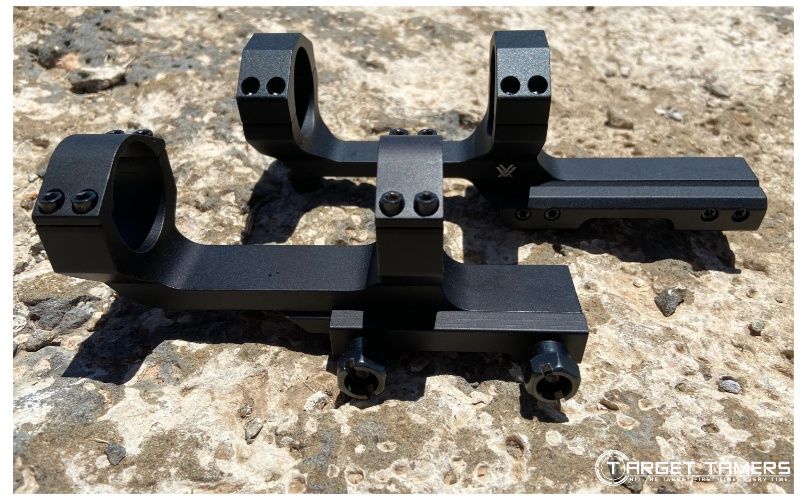
On average, a red dot sight or an LPVO is what usually goes on a Ruger AR-556. They’re set up with the right optical axis height on mounts that encourage a natural cheekweld with the flat-top rifle. Magnified scopes can go on an AR-15, but there can be difficulties with the mounting setup.
Cantilever mounts are usually the best type of mount for the Ruger rifle as there is limited rail space on the upper receiver before the handguard. You may need to remove the rear flip-up sight to fit a scope, LPVO, or a red dot and magnifier combo.
While most red dots come with included mounts in the box, it’s unlikely that scopes and LPVOs will come with an included mounting solution. If it does, it’s instant value!
| Product | Tube Size | Included Mount |
|---|---|---|
| Trijicon ACOG TA31 | N/A | TA51 thumbscrew mount |
| Holosun HS510C | N/A | Quick release lever mount |
| Vortex Strikefire II | 30 mm | Single ring cantilever mount |
| Primary Arms GLx FFP | 30 mm | No |
| Maven CRS.2 | 1 inch | No |
| Vortex Strike Eagle FFP | 30 mm | No |
| Bushnell AR Optics | 30 mm | No |
| Sig Sauer Romeo 5 | N/A | Absolute co-witness & low-profile mount |
Warranty
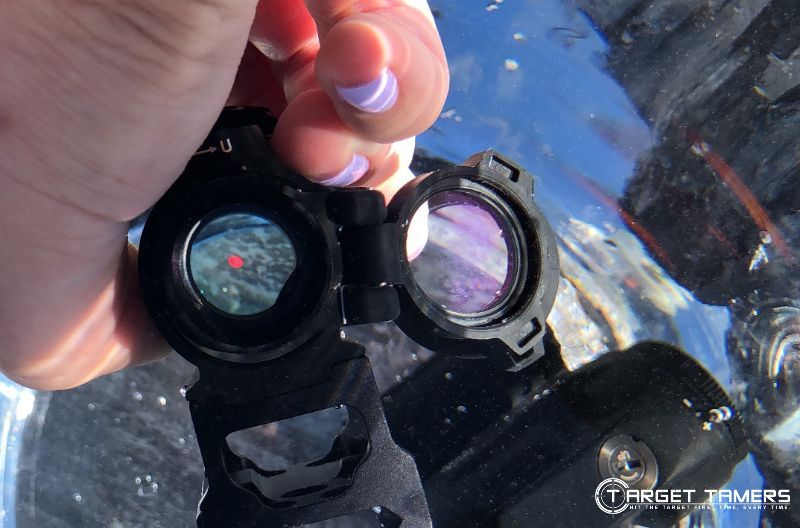
The best warranties are unconditional. This means that the manufacturer will cover repairs or replacements free of cost regardless of who originally bought the optic and where. The catch in the warranty will be on the electronics since many scopes and red dots feature illumination.
| Product | Warranty | Warranty Features |
|---|---|---|
| Trijicon ACOG TA31 | Limited Lifetime Warranty | Original owner only, tritium lamp warrantied for 15 years |
| Holosun HS510C | Limited Lifetime Warranty | Registration required, 10 years on the illumination |
| Vortex Strikefire II | VIP Warranty | Unlimited, unconditional, lifetime |
| Primary Arms GLx FFP | Limited Lifetime Warranty | Fully transferable, no receipt required, normal wear & tear covered |
| Maven CRS.2 | Unconditional Lifetime Warranty | Unlimited, unconditional, lifetime |
| Vortex Strike Eagle FFP | VIP Warranty | Unlimited, unconditional, lifetime |
| Bushnell AR Optics | Ironclad Warranty | Fully transferable, no receipt required, lifetime |
| Sig Sauer Romeo 5 | Electro-Optic Infinite Guarantee | Unlimited lifetime, fully transferable, electronics covered for 5 years |
FAQ's
The LPVO provides a good, in-between solution between a magnified scope and a non-magnified red dot sight. Excellent for close range use but with some mid-range distance, the LPVO is a great middleman. A scope can provide more precision at distance, but a red dot is perfect for CQB distances.
On average, a scope can take the 5.56 NATO caliber out further and with more precision than a red dot sight. The LPVO scope is usually the recommended type of optic for a flat-top MSR. With the right mount, a larger magnified scope can be excellent to extend the range of applications of the AR-15.
The best AR-15 sight in this list for deer hunting would be the Maven CRS.2 4-16x44. The best sight could be the Trijicon ACOG. Though the 5.56 NATO isn’t my first choice for a deer hunting cartridge, it’s done. There’s also the Ruger AR-556 in .300 Blackout that could be an option.
Arguably, the Ruger AR-556 can be a 1000-yard shooter, but it’s effective max range would be about 800 yards. With an LPVO, it’s most likely up to around 300 yards for most uses. With a red dot sight, most applications would be inside 100 yards.
Scopes for Ruger AR-556: Which is Best for You?
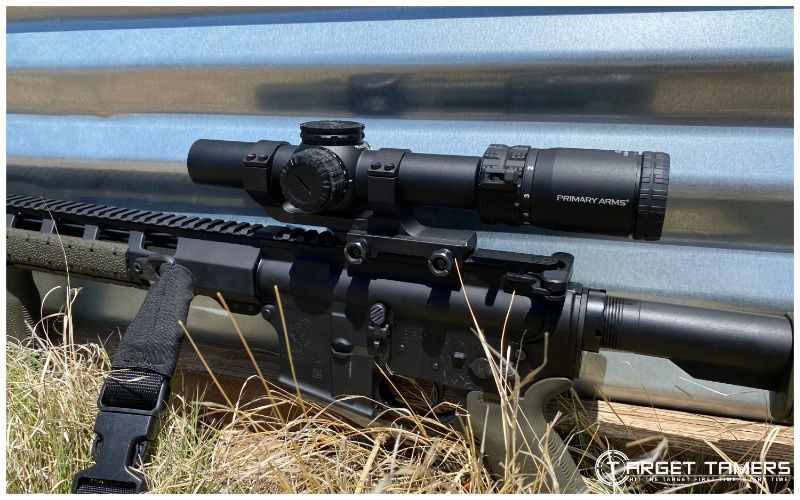
The best scope for a Ruger AR-556 will be the one that has the features that fits the need for your application. You might have to spend more if you’re looking for a duty-grade optic or invest in a quality mount to get a big scope on the rail. Whatever the pick, it must the right tool for the job.
Most of the time, a Holosun HS510C sits atop this rifle, but I’m all for switching it up to see what works best for whatever I’m doing in the moment. This might mean an LPVO or scope if it’s ‘yote hunting but then a compact red dot sight if I’m hitting steel at the range or taking down a constant onslaught of pests in rural country. What are you using your Ruger for?
Further Reading






